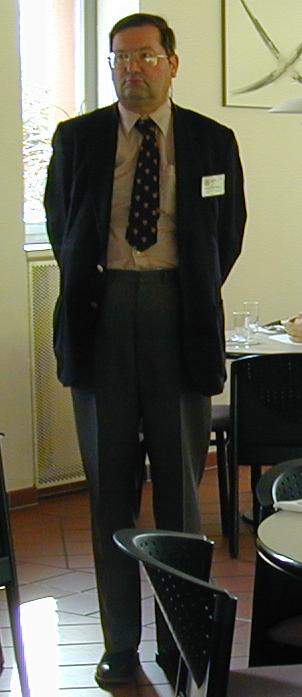Related Research Articles

Arthur John Robin Gorell Milner, known as Robin Milner or A. J. R. G. Milner, was a British computer scientist, and a Turing Award winner.
Speculative execution is an optimization technique where a computer system performs some task that may not be needed. Work is done before it is known whether it is actually needed, so as to prevent a delay that would have to be incurred by doing the work after it is known that it is needed. If it turns out the work was not needed after all, most changes made by the work are reverted and the results are ignored.
Reduce is a general-purpose computer algebra system geared towards applications in physics.

Hermann Maria Hauser, KBE, FRS, FREng, FInstP, CPhys is an Austrian-born entrepreneur, venture capitalist and inventor who is primarily associated with the Cambridge technology community in England.
The Adams Prize is one of the most prestigious prizes awarded by the University of Cambridge. It is awarded each year by the Faculty of Mathematics at the University of Cambridge and St John's College to a UK-based mathematician for distinguished research in the Mathematical Sciences.

Lawrence Charles Paulson is an American computer scientist. He is a Professor of Computational Logic at the University of Cambridge Computer Laboratory and a Fellow of Clare College, Cambridge.

Steel Bank Common Lisp (SBCL) is a free Common Lisp implementation that features a high-performance native compiler, Unicode support and threading.

University of Southampton School of Medicine is a medical school in England. It is part of the University of Southampton with a site at Southampton General Hospital, offering 5 Medicine courses, all leading to the award of Bachelor of Medicine, Bachelor of Surgery (BMBS). Graduates of the BM5/BM6/BM(EU) programme are also awarded an integrated BMedSc (Hons) degree. Prior to 2013, the Bachelor of Medicine (BM) degree was awarded.
John Peter Fitch is a computer scientist, mathematician and composer, who has worked on relativity, planetary astronomy, computer algebra and Lisp. Alongside Victor Lazzarini and Steven Yi, he is the project leader for audio programming language Csound, having a leading role in its development since the early 1990s; and he was a director of Codemist Ltd, which developed the Norcroft C compiler.

James Harold Davenport is a British computer scientist who works in computer algebra. Having done his PhD and early research at the Computer Laboratory, University of Cambridge, he is the Hebron and Medlock Professor of Information Technology at the University of Bath in Bath, England.

The Sedgwick Museum of Earth Sciences, is the geology museum of the University of Cambridge. It is part of the Department of Earth Sciences and is located on the university's Downing Site in Downing Street, central Cambridge, England. The Sedgwick Museum is the oldest of the eight museums which make up the University of Cambridge Museums consortium.

The Computer Science Tripos (CST) is the undergraduate course in computer science offered by the University of Cambridge Computer Laboratory. It evolved out of the Diploma in Computer Science, the world's first taught course in computer science, which started in 1953. Successful candidates are awarded a Bachelor of Arts (BA) honours degree after three years or, a combined BA + Master of Engineering (MEng) honours degree after four years of study, though admission to the fourth year is usually contingent on attaining a first-class result in the third year.
Computational particle physics refers to the methods and computing tools developed in and used by particle physics research. Like computational chemistry or computational biology, it is, for particle physics both a specific branch and an interdisciplinary field relying on computer science, theoretical and experimental particle physics and mathematics. The main fields of computational particle physics are: lattice field theory, automatic calculation of particle interaction or decay and event generators.

Acornsoft LISP is a dialect and commercial implementation of the Lisp programming language, released in the early 1980s for the 8-bit Acorn Atom, BBC Micro and Acorn Electron computers.

Marta Zofia Kwiatkowska is a Polish theoretical computer scientist based in the United Kingdom.
Cambridge Algebra System (CAMAL) is a computer algebra system written in Cambridge University by David Barton, Steve Bourne, and John Fitch. It was initially used for computations in celestial mechanics and general relativity. The foundation code was written in Titan computer assembler,. In 1973, when Titan was replaced with an IBM370/85, it was rewritten in ALGOL 68C and then BCPL where it could run on IBM mainframes and assorted microcomputers.
Stephen Gull is a British physicist based at St John's College, Cambridge credited, together with Anthony N. Lasenby, Joan Lasenby and Chris J. L. Doran, with raising the interest of the physics community to the mathematical language and methods of geometric algebra and geometric calculus. These have been rediscovered and refined by David Hestenes, who built on the fundamental work of William Kingdon Clifford and Hermann Grassmann. In 1998, together with Lasenby and Doran, he proposed gauge theory gravity.

Valeria Correa Vaz de Paiva is a Brazilian mathematician, logician, and computer scientist. Her work includes research on logical approaches to computation, especially using category theory, knowledge representation and natural language semantics, and functional programming with a focus on foundations and type theories.

Information engineering is the engineering discipline that deals with the generation, distribution, analysis, and use of information, data, and knowledge in systems. The field first became identifiable in the early 21st century.
References
- 1 2 "Computer Laboratory: 2008-03-12: Arthur Norman's last lecture". Cl.cam.ac.uk. Retrieved 15 December 2016.
- ↑ "Multithreading - The Delphi Way". Seti.net. Retrieved 15 December 2016.
- ↑ Markus Kuhn. "Unix Tools" (PDF). Cl.cam.ac.uk. Retrieved 15 December 2016.
- ↑ "Trinity College Science Society". Tcss.soc.srcf.net. Retrieved 15 December 2016.
- ↑ "Trinity College Science Society". Tcss.soc.srcf.net. Retrieved 15 December 2016.
- ↑ Arthur Norman; Gillian Cattell (1983). LISP on the B. B. C. Microcomputer. Amazon.co.uk. ISBN 9780907876083 . Retrieved 15 December 2016.